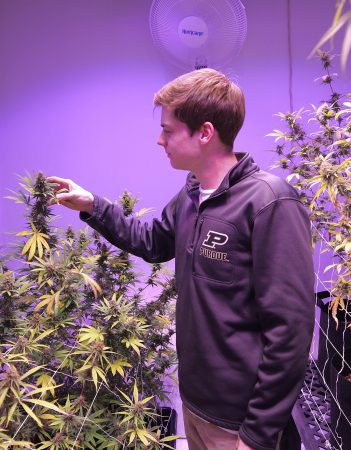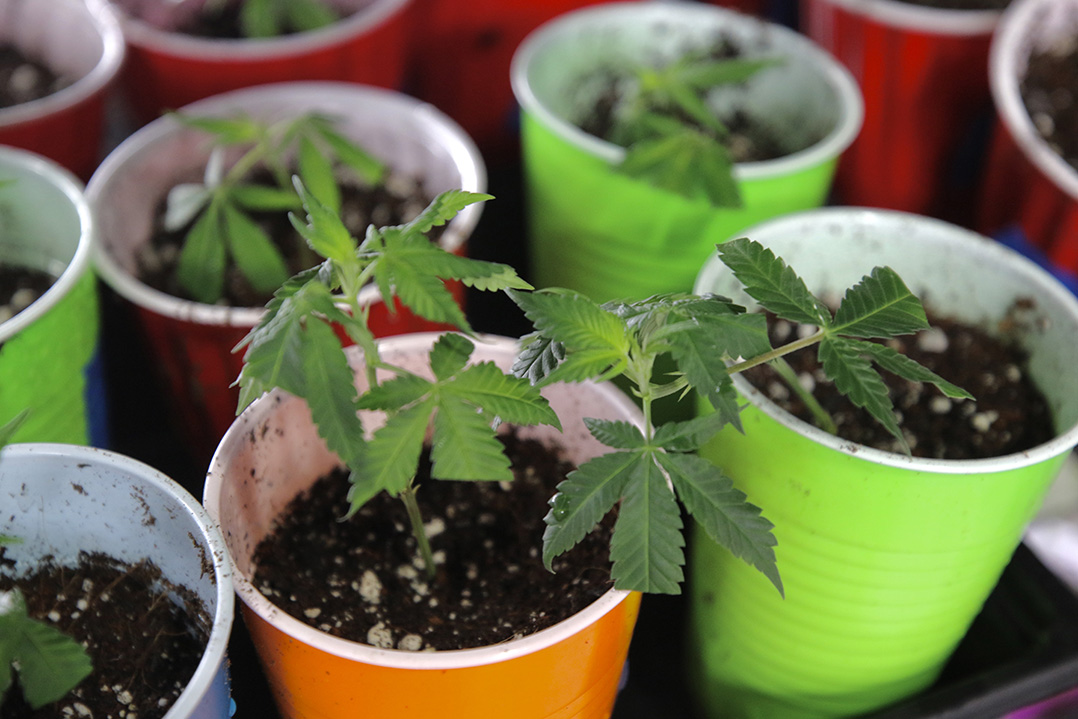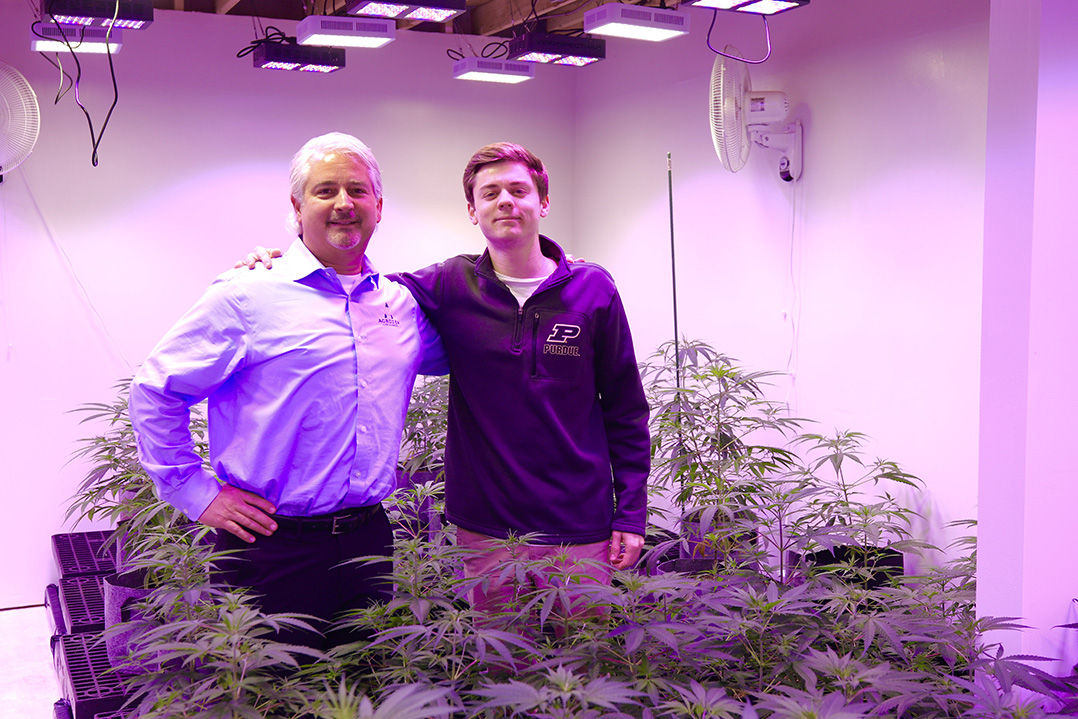Two years ago, a father and son had a business plan in hand, waiting for CBD products to become legal.
Following General Assembly approval in February 2018, the wait ended, and Brian Schroeder and his son, Austin, hit the ground running. They launched Agrozen Life Sciences, a hemp research and development company that calls central Carmel home.
Agrozen is a licensed hemp grower and processor in Indiana. Approximately 100 licenses were given in 2019. In 2020, 300 will be given by the Office of the Indiana State Chemist.

“We’ve been residents of Carmel for more than 20 years,” said Brian Schroeder, Agrozen’s president and CEO. “We love the city, and we wanted to start this business here. We researched the industry for about four years prior to launching the business. After completing our research to really understand what the hemp plant could do and the benefits of the cannabinoids, we decided that this was definitely the direction we wanted to go.”
Agrozen began working with hemp plants in its research and development cultivation center to derive oil from the bud of female hemp plants to extract cannabinoids, the chemical compound that research has shown is beneficial in treating nausea, anxiety, inflammation and other conditions. Austin Schroeder works daily in the cultivation center researching various strains of the hemp plant, grown from seeds purchased from around the world, with the goal of finding the best strain to be grown in Indiana.
Strains that grow well are then propagated dozens of times, with “clone” plants producing the exact results of the plant from which it was propagated.
In December 2018, President Donald Trump signed the 2018 Farm Bill, which removed hemp plants with a level of 0.3 percent or lower THC – the psychoactive component of the plant – from the Controlled Substances Act.
In the aftermath, farmers in Indiana began planting acres of hemp seeds and clones.
“This is a brand-new agricultural commodity for farmers, so a lot of farmers learned many lessons in 2019,” Brian Schroeder said. “There were environmental issues in the beginning. It was extremely wet. The plant doesn’t like to have wet feet. At the end of the harvest season, samples have to be sent in to Purdue to be tested. If your samples test above 0.3 percent in total THC, you have to destroy your crop. There were many farmers who had product that met these regulations, while others did not.
“To put this in to perspective, an acre can grow roughly 1,200 to 1,600 plants, and can cost anywhere from $1 to $5 per plant and have a harvest value of $200 to $500 each. There were many farmers who invested a lot of money in the industry, and some of them are now upside down.”
But this is where Brian Schroeder said he hopes Agrozen can step in.
The start of the new year brought good news for the company – the approval of professional pharmacy licensing that allows Agrozen to test and cultivate plants with a THC level of more than 0.3 percent. With a full laboratory at the back of the Agrozen headquarters, Brian Schroeder said he looks forward to helping farmers monitor plants to avoid destroying entire crops. Currently, farmers are required to send samples of their crop to Purdue University, which has been charged with, in conjunction with the USDA, regulating farmers’ hemp crops and companies that grow hemp to produce CBD, or cannabidiol, products.
“We’ve procured all the laboratory equipment to be able to test not only our own hemp, but any farmer’s hemp,” Brian Schroeder said. “We’ve had meetings with Purdue University. We’ve met with their laboratory director and their quality control personnel. Purdue understands with the rapid growth of the industry, they will need additional resources this year when farmers start harvesting in the September/October time frame.”
Now, Agrozen will work with farmers directly, along with Purdue. As plants are grow and mature, the company will help determine THC levels.
“The key is to be able to get as close to that 0.3 percent THC level as possible because as (the plant grows), cannabinoids increase, but so does the THC,” Schroeder said. “If farmers can figure out exactly when they need to harvest, it’s critical because the value of the crop increases as cannabinoid profiles increase. So, if the farmer wants to test their product every few weeks, they can send a sample to us, and we’ll tell them exactly where their plant is during the growing process.
“The other piece is companies can send us their samples for CBD products, and we’d be able to offer them a certificate of analysis on their products to be certified by Agrozen Labs.”
Schroeder said when samples are dried, prepared and ready to be tested by Agrozen, results can be generated in 48 hours using the lab’s HPLC machine, a liquid chromatography device that separates and identifies components of the sample, such as its cannabinoid profile and THC levels.
Learn more at agrozen.com.

FULL SPECTRUM OF CBD
Since becoming legal in early 2018, CBD products have flooded the retail market, popping up at gas stations and in dedicated brick-and-mortar storefronts, but with newness comes a learning curve for the public.
Brian Schroeder, president and CEO of Agrozen Life Sciences, said CBD products can vary dramatically, sometimes confusing the consumer. Different products do different things and range from basic hemp oil with no CBD to the best of it all in “full-spectrum” offerings.
“Hemp oil is the oil derived from pressed hemp seeds that gives you omega-6, omega-3 and fatty acids, but there are no cannabinoids in the product whatsoever,” Schroeder said. “If you go to the other extreme, which is full spectrum, meaning hemp extract oil comes from the actual plant buds, you’re getting hundreds of cannabinoids in the actual product, so you get a true benefit. In between, you have broad spectrum, which has no THC in it, and then you have isolate, which is just a molecule from the hemp plant.
“There’s definitely a wide variety of CBD product on the market, but in terms of anxiety and sleep and a lot of other typical conditions that research is showing are helped with cannabinoids, full spectrum gives you what’s called the entourage effect. Essentially, you’re getting all the benefits that the plant is providing instead of separating little pieces out.”





